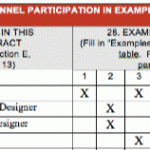
Have you ever been frustrated by an illogical decision a client, coworker, or friend has made?
You just look at it and ask, “What are they thinking?”
They’d have to be insane to make that decision, right? It can make you want to pull your hair out. It can make you want to scream at the top of your lungs.
Why do people who, for all intents and purposes, we know are sane…
…make completely illogical decisions?
Here’s just a few examples of things I’ve heard people, who I know are sane, say “no” to:
I will give you a $60,000 contract, just introduce me to one person.
Since people who buy your book often hire you as a consultant, shouldn’t you get that book in as many hands as possible?
I will donate copies of my book ($4,000 worth) for you to give to your SMPS chapter. No strings attached.
No, I’m not offering these to you. Don’t email me for the $60,000 contract. :p
I’m just illustrating how sane people make completely illogical decisions.
If you think about it, we’ve all seen this. How could anyone understand illogical decisions? Why can’t people just make logical decisions like we do?
I think we deserve an answer. Don’t you?
The Logic Test
A while ago, I sent someone a copywriting sample I knew they’d hate.
It’s a brilliant, and relatively famous, piece of copywriting. But if you don’t understand copywriting, the idea of using copy like this will rub you the wrong way.
You can read it here. But let me explain what it is.
It’s a sales letter. The core message is this:
“Spend 45-90 minutes on the phone with me and I’ll develop a plan that will double or quadruple your business in the next 12 months. I won’t charge you anything. The plan is yours for free. And if you don’t find the call incredibly valuable, I’ll pay $1,500 to compensate you for the time (no questions asked).”
Now let’s think about that pitch for a second. That pitch alone is extremely compelling. Think about the confidence you’d need to make someone that offer.
But then he spends six or seven pages explaining that he’s dead serious. He details his reasoning, the people he’s helped, and even who he won’t accept a meeting with. It’s a very sophisticated piece of copywriting.
The Elephant In The Room
As a business owner that meets his criteria, you can’t give a logical “no” to this sales letter. Your brain won’t be able to reason its way to a no.
Only your “gut” will be able to deny this offer. Only a psychological or emotional response will offer you a way out.
You’ll say, “It just doesn’t feel right.” But you might not be able to put your finger on just why.
It might be the fear of doubling your business (yes, that’s a real thing). Or the fear of failing. It could be the sneaking suspicion that your time will be wasted and this person won’t give you the money. These are all very real reactions you might have.
What it won’t be is a logical argument. There is no logical decision but “yes.”
The Elephant In The Room
So many of our decisions are like that. Your “gut instinct” is like an elephant. Your logic is like a boy riding that elephant.
If the elephant sees a peanut and starts running towards it, there is nothing the rider can do. The elephant is in control.
We are not these mechanical beings that make decisions based on logic. We just like to think we are. The reality is, we have many cognitive biases that shape our decision making. These are fixed-action patterns, pre-programmed responses, our brains use to help us make decisions. And these biases, these patterns, do not care about logic.
Not only that…we can’t turn them off.
Over 90% of the time, our psychological and emotional responses take over. The elephant takes over. All our logical rider can do is try to justify why he moved to that location.
He’ll say, “That’s where I wanted to go anyway.” That’s known as the interpreter mechanism.
You see, it’s very hard for our logical rider to admit he has no say in where the elephant goes. Therefore, we subconsciously come up with some BS rationalization for our behavior.
In our heads, this rationalization is truth. It came from our mind so it must be true, right? As a result, an illusion that we just made a logical decision is created.
Guiding The Elephant
Let’s get back to the illogical decisions of others. The problem isn’t that their decisions are illogical.
No, the problem lies within us. We have a false expectation that people use logic to make their decisions. That’s very rarely true.
If we continue to believe this fallacy, and base our perceptions on it, we’ll continue to be let down by the decisions of others.
On the other hand, once we are aware of the elephant. Once we stop expecting logic from others, we can understand illogical decisions and guide the elephant towards the destinations and decisions we want.
Now it’s your turn. Share one decision you’ve seen that defies all logic. Don’t include names or other identifying characteristics.





I had a client who waited until a week before a proposal due date to decide that she wanted to submit. The RFP required that the team’s project manager be PMP-certified (Project Management Professional). Her firm had no such person. I recommended not submitting. She said she would have a PMP-certified engineer from a subconsultant firm take the project manager role. I told her that the project manager MUST come from the prime consultant. She said that the owner would let that requirement slide in this instance because she was a small WBE firm. I said that wasn’t going to happen and, once again, recommended that she not pursue. She put a proposal together on her own and, needless to say, was not short-listed. At the debrief, she was asked why she submitted when she didn’t meet the first requirement of the RFP.
In my experience, when my first inclination is to wonder, “What was he thinking?” I have found that the correct question should have been, “Was he thinking?”
Good example. Thank you for the comment.
Example 1: Our local National Guard selected a highway and bridge specialist A/E to remodel their armory instead of the A/E that successfully and recently completed the second largest building remodel in DoD history.
Hmm, I wonder how that will turn out.
“I’ve decided we should NEVER congratulate anybody for a winning proposal. Someday we might forget to congratulate somebody and that would be bad.”
(Yes, you read it right. That’s from a COO, not a line from Office Space.)
Oh my goodness.
Woah! I’m really digging the template/theme of this site. It’s simple, yet effective. A lot of times it’s tough to get that “perfect balance” between user friendliness and appearance. I must say you have done a very good job with this. In addition, the blog loads very quick for me on Safari. Excellent Blog!
I bought my friend an elephant for her living room. She said, “Thanks.” I said, “Don’t mention it.”
Biggest illogical decision of my life: I purchased real estate with no inspections. Put pressure on myself to buy. I purchased 3 months ago and now have mental, physical and financial stress. I have tried to understand how or why I could have done this for weeks. I know now, I should have had inspections and inspections and inspections and then NOT buy. If anyone reads this, PLEASE do not make the same mistake that I did.
Yipes. Sorry to hear that Tony.